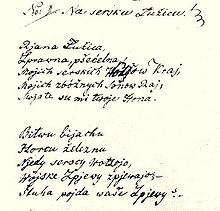Rjana Łužica
Rjana Łužica (the Lower Sorbian variant is called "Rědna Łužyca") is the anthem of the Sorbs .
history
On August 24, 1827, the then 23-year-old Sorbian theology student Handrij Zejler , who would later become one of the most important representatives of the Sorbian national revival, published in the handwritten newspaper "Serbska Nowina" distributed by the Wendish Prediger Society (Serbske prědarske towarstwo) in Leipzig a poem with the title “Na sersku Łužicu” (To the Sorbian Lausitz) . This poem comprised six stanzas and was set to music for the first time in the same year by Korla Benjamin Hatas (1806–1839).
After the poet Zejler and the composer Korla Awgust Kocor began their lifelong friendship as an artist, which resulted in many joint works, Kocor composed a new melody based on this text by Zejler in 1845. The newly created song was performed for the first time at the First Sorbian Singing Festival organized by Kocor on October 17, 1845 in Bautzen and enjoyed rapidly growing popularity, so that it quickly rose to the rank of a Sorbian national anthem, but only in the present is sung with two stanzas (the first and last of the original poem).
Hendrich Jordan took care of the translation of the text into the Lower Sorbian language, a German adaptation (which is not reproduced here for reasons of copyright) is by Kito Lorenc .
The shape of the song
The five-line poem form is underlaid with a seven-measure, upbeat melody, which is in F sharp minor in the original and defies all attempts at form analysis. The sustained tempo and the predominant minor harmonies give the hymn a solemn, melancholy mood that underlines the text of Zejler's original version.
Legal Status
The Sorbs (Wends) Act of the State of Brandenburg and the Saxon Sorbs Act stipulate the right to use the Sorbian hymn in the Sorbian settlement area . Rjana Łužica is, however, not explicitly mentioned in either of the legal texts - in contrast to some of the district statutes of the settlement area.
text
| Upper Sorbian | Lower Sorbian | German translation (literal) |
|---|---|---|
|
|
|
The original version by Zejler contains two further stanzas that have a distinct melancholy undertone and look into the uncertain future of the Sorbian people:
| Upper Sorbian | German translation (literal) |
|---|---|
|
|
Web links
- Sheet music for the Sorbian anthem at www.sorben.com ( Memento from December 4, 2007 in the Internet Archive )
